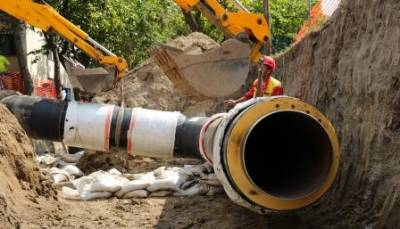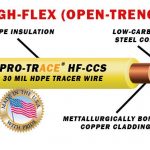9 Tips on Excavation Safety and Safe Digging Practices
At Linc Energy Systems we specialize in damage prevention, here are ten tips on promoting safe digging practices and pipeline excavation safety; including advice on trench shoring.
Excavation Safety
We all know that damaging a pipeline during excavation leads to construction downtime, loss of revenue, and endangers workers and people in the area. Our company specializes in pipeline damage prevention. We represent several manufacturers who offer solutions to prevent the loss of utilities, which keeps people safe and protects the environment. Here are great tips any excavator can use to avoid the damage of underground infrastructure.
 Pre-excavation Tips
Pre-excavation Tips
Probably the best tip I can give anyone is to become educated about excavating. In other words, understand the resources available to excavators and the legal requirements before digging.
- Do you have a pre-excavation checklist? There is an assortment of tasks requiring attention before the excavator should move dirt. Do you know what they are? Most excavators have a pre-excavation checklist which helps organize the excavator and reminds them of items needing attention.
- Know your one-call law. Each state has its set of one-call specifications. If you are an excavator, understand your state’s requirements before your project commences. Visit call811.com to connect with your desired state’s one-call requirements.
- Call 811 before you dig. Whether you are a contractor digging around a pipeline or a homeowner installing a fence, you must call 811 to have public utilities marked. If there are private services, you are also encouraged to call for a private locate.
- Understand your state’s tolerance zone and documentation requirements. Each state has its tolerance zone, an area on both sides of an identified utility. Each state also has its documentation and excavation requirements, particularly when excavating “in the zone.” Some require hand digging or hydro or vacuum excavation. Read more.
Safe Digging Practices
- If digging in the tolerance zone, document the dig by using tools, like the Hit Kit to properly mark your excavation site and keep your project in compliance with state requirements.
- If an excavator is required to enter a confined space, understand that the entrant must test the air quality before entering. Know when the excavator needs a confined space gas detector or confined space personal monitor.
- If trenching, explore trench shoring methods to prevent the collapse of the trench. Kundel V-Panel trench boxes are the most versatile equipment for trench shoring. The movable panels easily accommodate encountered facilities and structures.
- Rhino offers the Rhino Excavation Safety Kit which is a reusable, temporary marker and custom decal designed to alert potential excavators not to dig in a “high consequence” area. The “NO DIGGING IN THIS AREA” sign includes the marker and customized details to dissuade any excavator from digging near a high-pressure gas line.
- Here are ten more safe digging tips and practices.




I like the tip, Call 811 before you dig. That way when you do an excavation you don’t run destroy any pipes. That would add a lot of extra money to your expenses.
My husband and I will be installing a sprinkler system in the spring of next year. We don’t have very much experience when it comes to excavation so we have been doing research about what it all entails. I am really glad that I came across this list of safety tips, I know that they will really help us in the Spring!
I have been wanting to change things up in my back yard and that includes updating my sprinklers. There are a lot of things that I would like to do that would involve excavating so these tips are really good to know for when that time comes. I have little kids over at my house at least once a week so I will be sure to keep these tips in mind for their safety, thank you for sharing!
In my opinion, safety always comes first. I highly appreciate this information about how to keep safety a priority in excavation. It is wise to know the state’s tolerance zone and work accordingly. Another thing is to ensure that workers are wearing proper equipment
I need to excavate part of my yard so that I can add on to my house. I appreciate the information about how you should know your state’s tolerance zone, so that you can have all the proper documentation. Something else to consider is to get help from an excavation service so that you can be sure everything will go smoothly.
Thanks for the great excavation tips and the advice on how to stay safe! There is an excavation site right next to where my wife and I live and it is comforting knowing that they have someone who is always there to simply watch over the safety of the workers. We never knew that you could use a safety wrap to protect exposed pipes from bursting. Thanks for the information!